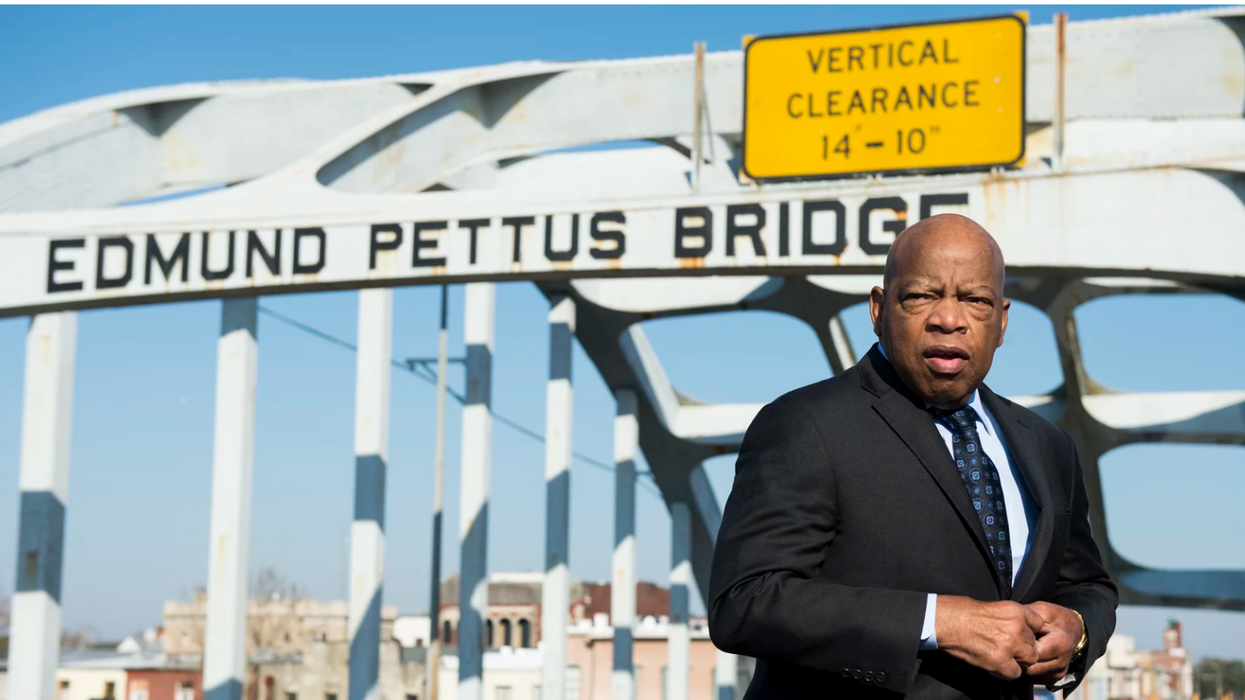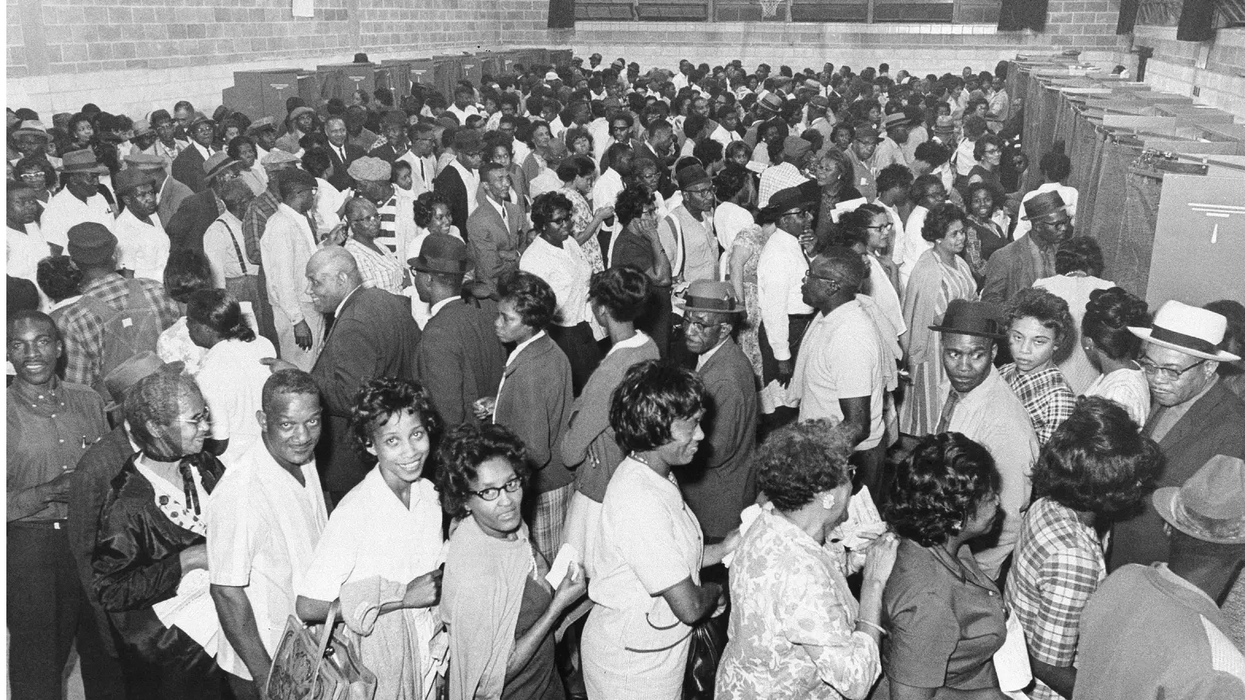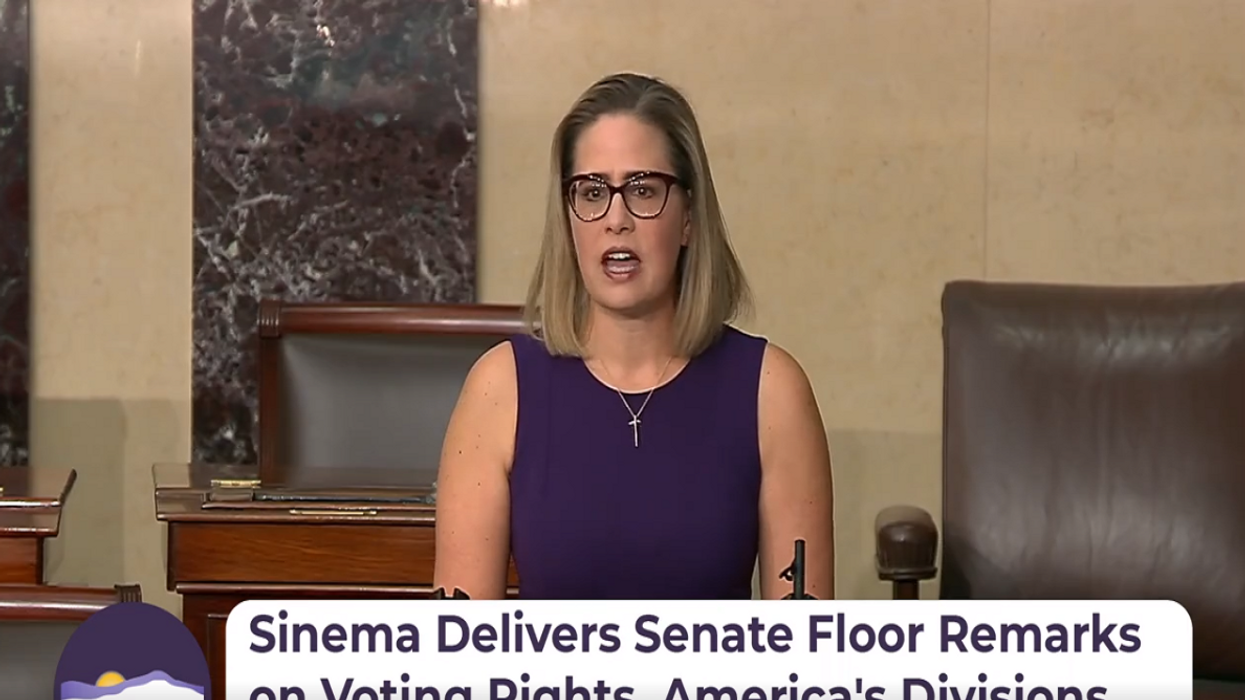Supreme Court Threatens To Wreak Havoc In Battleground State Elections
During the aftermath of the 2020 presidential election, more than 60 of Donald Trump’s lawsuits were readily dismissed by state and federal courts that cited a lack of evidence and rejected a radical argument in some cases – that only state legislatures were authorized by the U.S. Constitution to run elections.
Trump embraced that argument, called the independent state legislature (ISL) theory, as a way to overturn his defeat in key states. It had been gathering dust in right-wing think tanks and academia where it was championed under the banner of "constitutional originalism," whose adherents want government to mimic what the founders established in the 18th century.
As the January 6 hearings have shown, Trump saw the assertion of legislative authority as one way to seize a second term despite his rejection by voters. Republican-majority legislatures, led by his loyalists, theoretically could bypass their state’s popular vote and appoint pro-Trump Electoral College members. Even though courts rejected Trump’s lawsuits, and no legislature followed that script, 84 GOP activists and officials in seven swing states forged documents giving Trump their Electoral College votes.
“There is no legal theory that is more closely connected to Trumpism and the failed January 6 coup,” Marc Elias, a Democratic Party lawyer, wrote in a July 6 blog.
The notion that arch-partisans should subvert elections did not end with Trump’s defeat. Instead of receding into ignominy, his attempt to push state legislators to muscle their partisan outcomes can now be seen as opening a wider window with potentially deep anti-democratic consequences.
Unlike Trump’s bungling lawyers, the activist Supreme Court will hear a case next fall that centers on the independent state legislature theory. The narrow question in Moore v. Harper is whether the North Carolina Supreme Court can overrule its legislature that drew gerrymandered districts. If some version of the ISL theory is validated, the Supreme Court could eventually gut the modern system of checks and balances that govern state elections.
“This would be as deep a dig into American democracy that we’ve seen in at least a century,” said Larry Jacobs, director of the University of Minnesota’s Center for Policy and Governance. “Just look at the recent period. Both Democratic and Republican states have passed laws to enhance their party’s opportunities in November and have had their supreme courts step in and reject those.”
“And that’s an example of the kind of institutional battle that the American system of separation of powers, both at the national level and the state level, has invited,” he said. “What the North Carolina case foretells, if it’s actually upheld by the Supreme Court, is an end to that at the state level. It would remove the state courts as a check on the rapacious use of partisan power.”
Jacobs and other election scholars emphasize that the acceptance of a case does not mean that the court’s mind is made up – even though three justices have said in other rulings that they support the independent state legislature theory. But rather than reject the case outright, the Supreme Court is lending credence to a power grab that has been, until now, inconceivable in mainstream legal circles.
“The ultimate big problem with ISL theory is that we’ve always run our elections differently,” said Thomas Wolf, deputy director of the Brennan Center for Justice at New York University Law School. “You really do end up where the legislature is essentially supreme with the exception of some federal constitutional, or some federal legal checks, on their power.”
Runaway Trump Republicans
The 2020 election’s aftermath has shown what Trump Republicans are willing to do – and suggests what the Supreme Court might validate or incite.
The cadre that forged Electoral College documents in swing states was not alone. On January 6, 2021, after a mob delayed Congress’s certification of the Electoral College winner, eight senators and 139 representatives voted to reject Biden’s victory. Back in battleground state capitals, pro-Trump legislators followed up by launching bad-faith investigations to hunt for illegal voting – Trump’s excuse for why he lost; not that he was rejected by GOP moderates.
The post-2020 legislative inquiries found nothing. But the disinformation they sparked on pro-Trump media convinced his base that Joe Biden was not elected legitimately. Legislatures are not courtrooms. The pro-Trump legislators faced no penalty for indulging evidence-free conspiracies apart from not getting re-elected. (As of mid-June 2022, more than 100 election-denying candidates for statewide office or Congress have won their GOP primary.)
The big lie, nonetheless, led to Republican-controlled legislatures passing new laws to complicate voting in Democratic strongholds. Democratic governors in states like Michigan, where Republicans control the legislature, vetoed the new laws. Republican governors in Florida, Georgia and Arizona signed them.
While many of the initial reactions to the Supreme Court’s acceptance of Moore v. Harper have concerned its potential impact in 2024’s presidential election, further reflection by election experts suggests that any embrace of the ISL theory could enable major backsliding on the frontlines of American democracy.
The fallout could include the dismantling of nonpartisan government election administration by replacing best practices – which, during 2020’s pandemic, allowed for more voting options – with brazen partisan schemes.
“There’s the cataclysmic potential impact on the separation of powers in the American federal system,” said Jacobs, who also oversees a program that trains election officials. “There’s also a practical impact of the nonpartisan professional administration of elections, the work that very few Americans know about, but that’s responsible for the fair conduct of our electoral machinery.”
Election Administration Impacts
A few pundits have asked what state legislatures could do if they faced no checks and balances from their state constitution, state supreme court, gubernatorial vetoes, and state agencies. One scenario is legislators could grant themselves the power to certify all winners. But the possible impacts are much wider and more local, as a look at post-2020 litigation, legislation and enacted laws reveals.
“In the run up to the November 2020 presidential election, state courts heard and considered dozens of cases involving the application of state election law,” Elias noted. “As importantly, after the election, Trump and his allies lost 28 lawsuits in state court, nine of which involved the Trump campaign itself. In 2021, at least 39 voting rights and redistricting lawsuits were decided at the state court level.”
The scope of these lawsuits and legislation involves almost every stage in voting and counting ballots. Before 2020’s Election Day, there was litigation about voter registration, voter purges, voter ID laws, limits to voter assistance, absentee ballot requirements, use of drop boxes to return those ballots, absentee ballot return deadlines, timetables for fixing mistakes by voters and more.
In response to Trump’s loss, Republican-led legislatures have imposed new limits on voter assistance, rolled back voting with mailed out ballots, expanded partisan observers and imposed penalties on election officials who may seek to maintain order, and, in Georgia, reconstituted local election boards with GOP appointees.
In other words, partisan legislatures that face no checks and balances could drastically change how their state’s elections are run. That reaction was seen in 2013 in many southern states, after the Supreme Court ended the Justice Department’s federal oversight of new election laws and rules under the 1965 Voting Rights Act. Like today’s abrupt shuttering of abortion providers in red states, that 2013 ruling saw numerous voting restrictions erupt.
A May 2022 report by a trio of pro-democracy groups, A Democracy Crisis in the Making: How State Legislatures are Politicizing, Criminalizing, and Interfering with Election Administration, previews what may come if the ISL theory is validated.
The groups tracked hundreds of bills in 32 states and found five categories of legislative overreach: “Usurping control over election results,” “Requiring partisan or unprofessional ‘audits’ or reviews,” “Seizing power over election responsibilities,” “Creating unworkable burdens in election administration,” and “Imposing disproportionate criminal or other penalties.”
Enacting these measures would upend America’s elections – damaging voters, election officials and the legitimacy of US democracy – it concluded.
“Left unchecked, these legislative proposals threaten to paralyze the smooth functioning of elections,” it said. “Election administrators could be left powerless to stop voter intimidation. Election rules could devolve into a confusing and contradictory tangle, subject to change at the whims of partisan lawmakers. Election results could be endlessly called into question and subjected to never-ending, destructive reviews conducted based on no responsible standard. At the extreme, election results could simply be tossed aside, and the will of the people ignored.”
The key phrase from that assessment was “left unchecked,” which is exactly what the U.S. Supreme Court’s originalists might unleash in Moore v. Harper.
Steven Rosenfeld is the editor and chief correspondent of Voting Booth. He has reported for National Public Radio, Marketplace, and Christian Science Monitor Radio, as well as a wide range of progressive publications including Salon, AlterNet, The American Prospect, and many others.
This article was produced by Voting Booth, a project of the Independent Media Institute.












